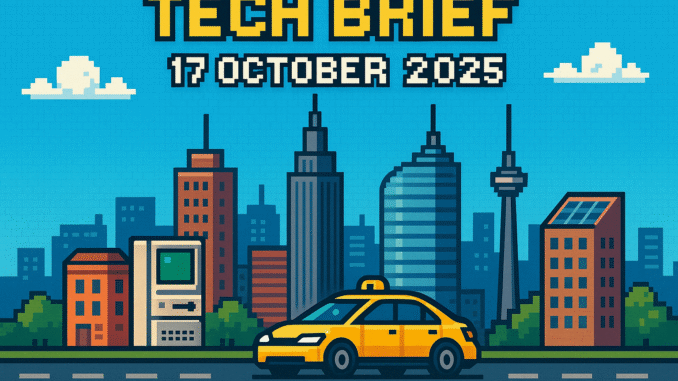
“It wasn’t supposed to end like this.” Tech Brief 17 October 2025 opens with the plain facts: British institutions still wrestling with legacy systems, the capital bracing for driverless cabs, and old software ghosts refusing to stay buried. Whether you’re here for the legal fallout, a look at automation, or just to remember how we got here, there’s no tidy narrative today. Just lived reality.
Missed yesterday’s Tech Brief? Catch up here before diving in.
CCRC Sends Post Office Capture Conviction to Court of Appeal
“Another one for the appeals pile,” a campaigner said as the CCRC confirmed Patricia Owen’s Capture software conviction is now with the Court of Appeal. This extends the investigation beyond the infamous Horizon system, showing the Post Office wasn’t just burned by one faulty bit of tech. In the 1990s, many believed digital upgrades meant reliability. Instead, for real people, it unleashed chaos.
The expanding scandal still ripples through British tech history, a rare moment when IT errors upended legal precedent. Manuals from the time flagged error-handling gaps, but institutions pushed the tech anyway, trusting documentation would fix what code did not. It didn’t. For anyone who’s ever patched a Sinclair bug or coaxed life back into a battered Spectrum, the pain is no abstract IT failure.
Tech, when pressured by cost and closed culture, can corrode trust and upturn lives. Have we learned anything?
Legacy IT Poses Hurdles for AI Ambitions in Government
Here’s a hard number: no one actually knows how many legacy systems are rumbling away in Whitehall. Parliament is now demanding answers, worried new AI initiatives will buckle if run atop ancient, unmapped tech. This is how you end up with reform driven by panic instead of preparation.
It’s familiar if you survived the Y2K clean-up. There’s that same shuffling of priorities, the last-minute rush to identify what should have been obvious, which servers, languages, and platforms are still live. Complexity isn’t just a nuisance; it is an active threat to digital services people rely on daily.
This government IT saga reflects the same failings that left Post Office software unchecked for years. It is a callback not for nostalgia, but as a warning. New code will fail too if nobody can see the whole system. Modernisation demands more than good intentions.
Waymo Driverless Taxis to Roll Out in London
Would you step into a driverless taxi next year? Waymo’s announcement that its autonomous cabs will debut in London is making the city’s black cab drivers bristle. America’s tech firms promise smooth rides with AI, but they’ve never had to handle Soho after gig night or mind the quirks of the roundabouts near the Elephant & Castle.
Unlike Whitehall’s struggle with old systems, Waymo’s adventure is all about testing new ones on London’s challenging roads. There’s something oddly fascinating about decades of The Knowledge being condensed into neural networks, especially for those who still have a battered A-Z in a glovebox.
If this is progress, it runs on code written continents away, now being steered past toll gates and traffic cones. The tech is impressive, but will it earn Londoners’ trust? Maybe trust really is the last frontier for automation.
Barrister Used AI to Cite Fake Court Cases
A British immigration barrister was found to have cited “entirely fictitious” legal cases after using ChatGPT-style software for research. The tribunal noted that Chowdhury Rahman not only used AI but also failed to check if the references were genuine. The court wasted time as a result.
For those who value rigorous sourcing, this is the digital equivalent of misreading a BASIC manual and submitting a garbled program that won’t run. Legal experts now ask whether automation makes work more efficient or just moves the margin for error out of sight.
This story doesn’t linger on history. It’s about present consequences. Accuracy still matters; algorithms are not a shortcut for responsibility.
From the Wayback Machine
On This Day: 1990 – IMDb Launches as a Usenet Script
Col Needham’s then-experimental Unix shell script went public on 17 October 1990, transforming a private movie list into the now-booming Internet Movie Database (IMDb). Built from volunteer-submitted lists on rec.arts.movies, IMDb predated the World Wide Web, running on Usenet before being ported to Cardiff University’s website in 1993. By 1996, the project formalized as a business and, later, part of Amazon. IMDb’s crowd-driven approach and robust metadata structure set the template for Wikipedia, film wikis, and today’s streaming services. Even in 2025, its first ideals-transparency, open contribution, and a faint sense of DIY defiance-still feel radical.
Today’s Big Question
Tech Brief 17 October 2025 leaves me wondering: when code falls apart, do we seek comfort in tradition, or just swap out the hardware? Ask a London cabbie or anyone double-checking AI results in court. Reliability, it turns out, takes more than clever software.
Pull up an old manual, check your backups, and mind the gap. Progress isn’t always neat, but it’s ours to shape.
Missed yesterday’s Tech Brief? Catch up here

Leave a Reply